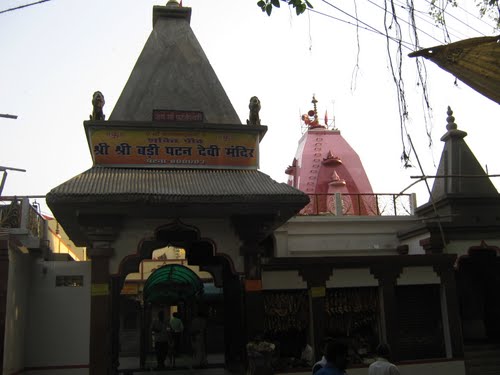Magadha Shakthi Peeth is the place where Devi Sati's Right Thigh fell. Here Devi is worshipped as Sarvanandakari (also known as Bari Patan Devi) and Lord Shiva as Vyomkesha. It is also believed that Devi Sati's "pat" (cloth) fell at Patna and the Devi is called as Choti Patan Devi.
Magadha Shakthi Peeth also known as Bari Patan Devi temple is located at Maharajganj, about 10 kms east from Patna Junction Railway Station, Bihar. Patna, being one of the ancient cities of India has derived its name from Patan Devi temples, the presiding deity.
The temple architecture is in Brahmanical style with liberal use of marble and mosaic stones.The Bari Patan Devi temple faces the north. At the entrance of the temple is a portico leading to the sanctum where the images of goddess Mahakali, Mahalakshmi and Mahasaraswati are in a standing position on a pedestal.
The deities are carved out of black stone. All the three deities are dressed in a sari with a mukut(Kirit) crown adorning the head.
Choti Patan Devi temple faces the south-east direction. This temple also has the same goddess as in Bari Patan Devi temple. There is also a big statue of the Sun god, broken into two parts located at the northern compound side of the Choti Patan Devi temple.
Sarvanandakari Shakthi Peethas is located at Patna in Bihar,India . This Temple is one among 51 Shakthi Peethas . Sarvanandakari Shakthi Peetha is dedicated to Goddess Durga .
When
Sati, the wife of Shiva, sacrificed herself at the Yajna performed by
her father Daksha, a very distraught Shiva started dancing with her
body. He was dancing the dance of destruction. And the gods said, "Oh,
we are doomed! Shiva is dancing the dance of destruction.
Vishnu took his bow and cut the body of Sati into fifty-one pieces with
his arrows. And wherever a piece of the Divine Mothers body fell on
earth, that place became a Shakti Peetha.
According to one puranic reference, the right thigh of Devi Sati fell near Maharajganj and the pat (cloth) fell at Chowk from which three small deities goddess Maa MahaKali, Maa Mahalakshmi and Maa Mahasaraswati emerged. The names of goddess Bari Patan Devi and Choti Patan Devi are derived from the word "Pat" (clothes) which fell at Maharajganj and Chowk.
The goddess are said to be the guarding deities who protected the founder of Pataliputra- Putraka. A stone image was found in a tank near the temple which is kept in the eastern veranda of the temple and is worshipped as a goddess.
Putraka was a mythological king who created the city by a magic stroke for his queen Patali, meaning "Trumpet flower", which gives the ancient city its name of Pataligram. In honour of the first born to the queen, the city was named as Pataliputra.
Do:
- Do pray your Ishta Devata before pilgrimage to Temple.
- Do contact Temple Devasthanam information centre for enquiry, temple information and for Pooja details etc.
- Do reserve your travel and accommodation at Temple well in advance.
- Do bath and wear clean clothes before you enter the temple.
- Do concentrate on God and Goddess inside the temple.
- Do maintain silence and recite your Istamantram to yourself inside the temple.
- Do observe ancient custom and traditions while in Temple.
- Do respect religious sentiments at Temple.
- Do deposit your offerings in the hundi only.
Don't s:
- Do not come to Temple for any purpose other than worshipping of God and Goddess.
- Do not smoke at Temple.
- Do not consume alcoholic drinks at Temple.
- Do not eat non-vegetarian food in the Kshetram.
- Do not approach mediators for quick Darshanam. It may cause inconvenient to others.
- Do not carry any weapon inside the temple.
- Do not wear any head guards like helmets, caps, turbans and hats inside the temple premises.
- Do not perform Sastanga Pranama inside the Sanctum Sanctorum.
- Do not take much time while performing Sparsa Darshanam to God in Garbhagriha.
- Do not buy spurious prasadams from street vendors.
- Do not encourage beggars at Temple.
- Do not spit or create nuisance in the premises of the temple.
